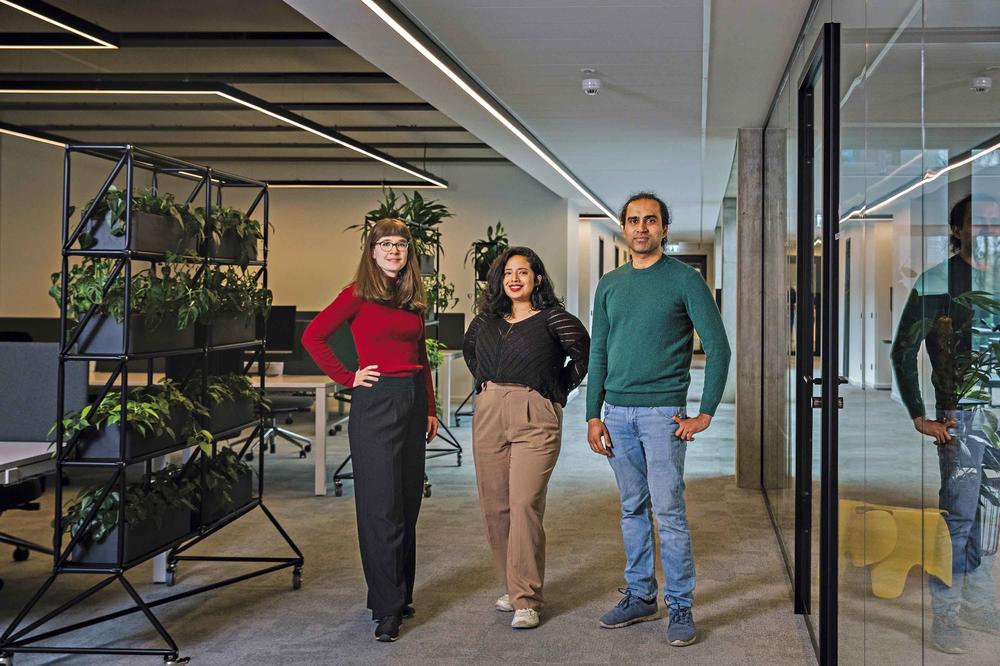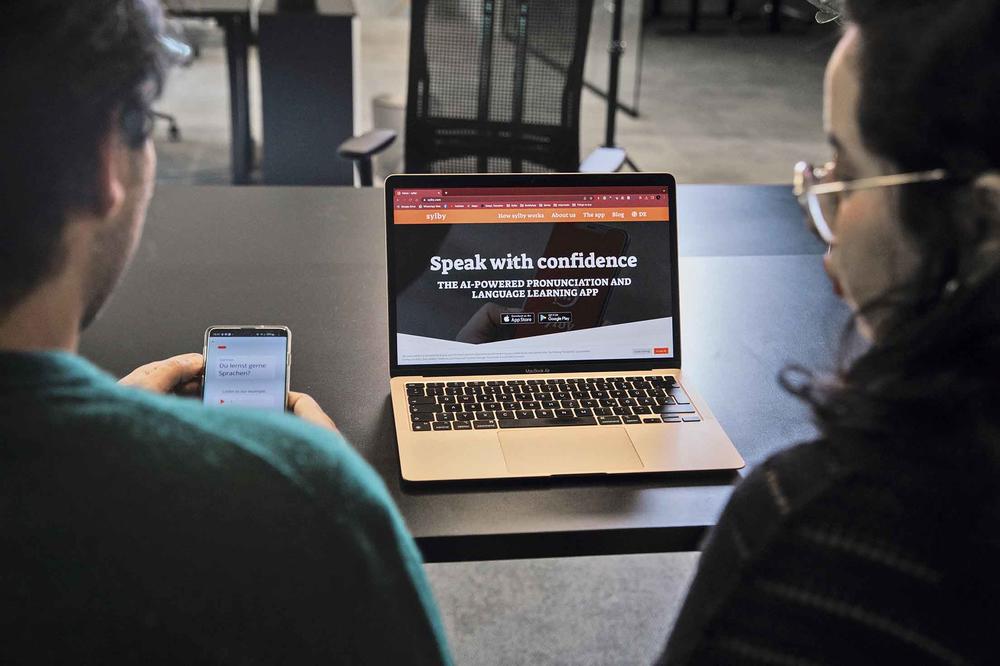"And now please repeat after the AI ..."
What is a humanities scholar doing in an artificial intelligence startup accelerator? Dr. Vera Scholvin is part of the leadership team of "sylby" with Dr. Paras Mehta and Yamile Vargas, whose app uses AI to help with language acquisition.
May 26, 2023
Actually, Dr. Vera Scholvin is a humanities scholar, a linguist to be precise. Her doctoral thesis deals with French loanwords in Vietnamese, their pronunciation and the laws and patterns that govern the linguistic incorporation of "fromage" and "gare" and "valise" into the Vietnamese language.
But right now, Scholvin is sitting in an accelerator for startups in the field of AI - a kind of catalyst for founders. The whole glass building in Berlin-Gesundbrunnen looks as if a set had been built for a movie, with "start-up culture" and "innovation" breathing out of every fiber. Everything flashes, blinks and reflects, and Scholvin invites you to interview him in two upholstered chairs hanging from the ceiling, dangling between meeting cubicles and seating areas for team meetings. In the cafeteria, a robot prepares food. It stands like an oversized beverage dispenser amid green potted plants, ping-pong tables and even more cushioned seating areas for team meetings and brainstorming sessions or meetups with venture capitalists.
In between, young people from around the world sit in glass offices in front of their laptops, trying to launch the next big thing. The Accelerator, which aims to accelerate startups in their development, is located in the "Merantix AI Campus Berlin." "AI" as in Artificial Intelligence: everything here is geared toward developing projects in which AI finds the most impactful and meaningful application possible. Like "sylby," the start-up that Scholvin launched together with Dr. Paras Mehta a year ago.
Support from the Entrepreneurship Network "NFUSION
Scholvin and Mehta met through "NFUSION," the entrepreneurship network of Freie Universität, which, as part of the Ernst Reuter Society, is a community of entrepreneurs from all start-up and business phases. Mehta is actually from New Delhi; he earned his doctorate in computer science at Freie Universität and then founded a healthcare start-up. In between, he worked as a software developer for a VW subsidiary. But it wasn't until he met Scholvin that he came up with the idea for "sylby": an app for AI-assisted language training aimed primarily at improving pronunciation. And it can do that specifically because it pays particular attention to which sounds are difficult for Italian- or Chinese- or Hindi-speakers in German.
Originally, the two wanted to solve a different problem. Scholvin tells of observing in her private life how speech recognition in a navigation device failed to understand people with strong accents. "They simply won't be understood by Siri or a sat nav if their pronunciation is significantly different from the standard German," Scholvin says. So she wanted to work with Mehta to develop methods to improve speech recognition programs so they could understand people with strong accents.
Pronunciation training is often neglected
But when the two began interviewing potential users, i.e., non-native speakers, for this purpose, they realized: These wanted to be better understood not only by machines, but in general and by everyone! Difficulties with pronunciation can be a real obstacle for some people in their everyday and professional lives; this ranges from simple difficulties in making oneself understood, to the feeling of not being taken seriously, to experiences of devaluation and discrimination. The problem is that even if someone then takes a language course, pronunciation training is often neglected. Actually, one needs a logopedically supported individual training and not just a "Repeat after me ...", in which one's own sounds are lost in the collective chanting of the whole class. So Scholvin and Mehta realized: Our original idea is not what people want most, but there would be a need for a small variation of the same thing. In both cases, we're talking about computer-aided language processing, the area where the expertise of Mehta, a software developer, and Scholvin, a linguist, meet. But the two have now developed an app that specifically helps users to work on their pronunciation, training them, for example, to form those sounds that do not occur in their native languages and are therefore particularly unpracticed and difficult for them.
The app "sylby" will help people who have difficulties with pronunciation and thus encounter problems in everyday life or at work.
Image Credit: Miriam Klingl
The rapid progress of AI
But what does AI actually mean in the case of "sylby"? Mehta explains it this way, "Artificial intelligence here means a deep-learning model that is specifically trained to detect and identify pronunciation errors in audio data." To train the AI model, Mehta fed and trained it with data sets already available and collected specifically for this purpose. So AI means you don't have to predefine in millions of lines of code which sounds are close enough to standard pronunciation to be understood. Rather, the model learns that as it trains. Mehta says, "We're coming up with this at the right time to take advantage of the rapid advances in AI. Five years ago, what we're doing today probably wouldn't have been technically possible. The accuracy of the models is just much higher today."
Scholvin and Mehta were first funded by "Profund Innovation," Freie Universität's start-up incubator. Then, thanks to an EXIST start-up grant, which the German Federal Ministry of Economics and Technology uses to support spin-offs from universities, they were able to work on their app for a year before officially launching "sylby" on the market in January 2023. That's a rapid pace even for startups. Then, in early 2023, Yamile Vargas joined "sylby" as the third executive; she primarily handles marketing and business development. After all, a start-up should grow, and that's what the Accelerator in Berlin-Gesundbrunnen is all about. So far, the company has two initial investors. But if the company wants to grow quickly, further investment capital would be helpful, because, as we all know, the competition never sleeps. "sylby" is only available for German so far, but the team is already planning to expand the offering to other languages in the coming months.
How does it feel to now be the founder of a successful start-up as a linguist? In 2018, while still a student pursuing her master's degree at Freie Universität, Scholvin had given an interview to Freie Universität's Online Subject Selection Assistant, in which she told first-year students about her experience. At the time, she spoke of the pressure to justify her choice of study as a linguist, and that she initially had no answer ready when asked what she could "do with it properly later on." This is one of the reasons why linguist Vera Scholvin is particularly pleased with the rapid success of the start-up. Now it's even possible to see in euros what her work is worth.
By Pepe Egger


